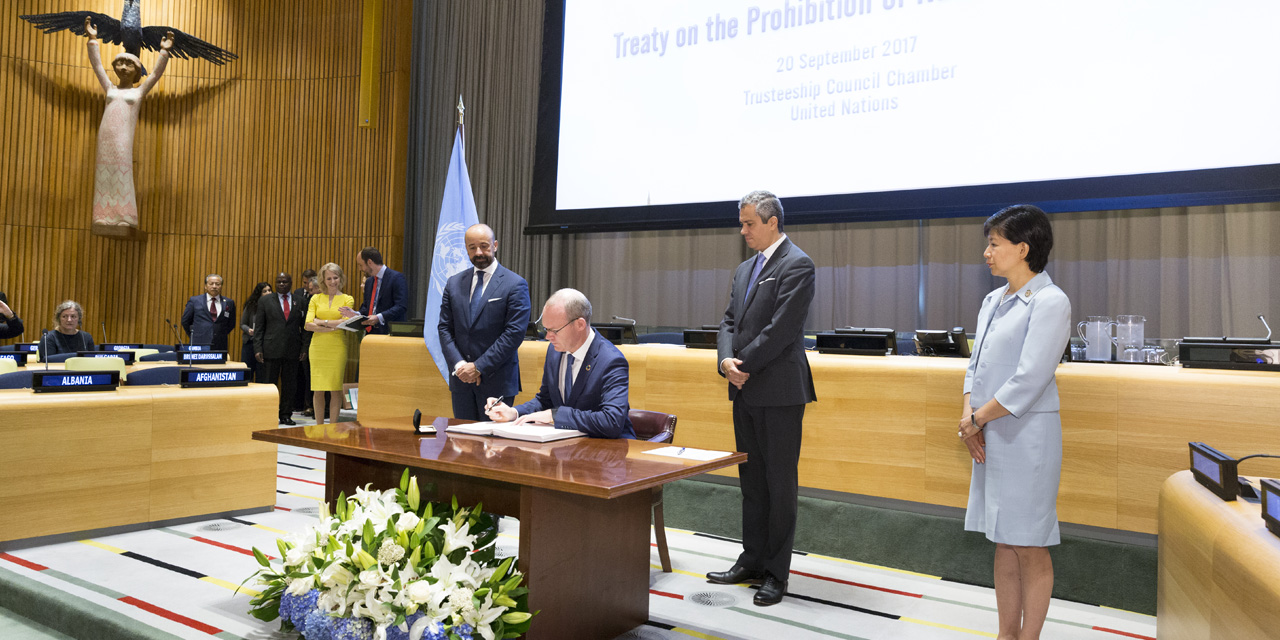Introduction
Increasing nuclear expenditure among nuclear weapons states against the pandemic background is warning us about the unavoidable cost attached along with the unstable strategic environment. These costs are sometimes presented by guns vs butter framework explaining the opportunity cost of public spending between buying big weapons for strategic deterrence (military spending) and an actual human security such as health care system, education or even communication (growth).
Nuclear weapons, warfare and strategic deterrence are still relevant until nowadays and will continue to hold a strategic importance and contribution to international governance. Therefore, to understand Southeast Asia disarmament efforts will help gain a clearer perspective on Southeast Asian nations strategic security position with the whole world as well as understanding Southeast Asia position in one of the most concerning affairs in the international community.
SEANWFZ, NPT, ASEAN and Southeast Asia Regional Non-Proliferation efforts
Southeast Asia has always been an active contributor to the global nuclear disarmament efforts. This is evidently presented by ASEAN involvement in the global nuclear disarmament efforts. For instance, SEANWFZ, NPT and TPNW.
Southeast Asia Nuclear Weapon Free Zone (SEANWFZ) is one of the five nuclear weapons free zones in the world. It was initiated by seven ASEAN member states and signed under the SEANWFZ treaty, also known as Bangkok treaty, in 1995. The SEANWFZ is one of the highlights of ASEAN contribution to nuclear disarmament efforts. This also linked to the strategic standpoint of the regional position regarding weapon of mass destruction governance as well as strategic security position in international affairs. The nuclear weapons free zone is the area where states, in the region, pledge not to manufacture, test, acquire or possess nuclear weapons.
The Nuclear Non-Proliferation treaty (NPT) is one of the most significant treaties regarding nuclear disarmament and non-proliferation. It is a treaty which carries the agenda on nuclear non-proliferation, preventing the spread of nuclear weapons, and also promotes the peaceful use of nuclear energy. Southeast Asia states, ASEAN member states and Timor-Leste, have signed the NPT.
Finally, the Treaty on the Prohibition of Nuclear Weapons (TPNW) adopted in July 2017 and entered into force early this year in January is a hopeful sign and an important step toward shifting the global security agenda with humanitarian approaches. The treaty itself prohibited the state parties from all activities related to nuclear weapons including developing, testing, acquiring and so on. And with the mentioned humanitarian approaches on nuclear disarmament efforts, TPNW also required state parties to provide assistance to the impact of nuclear weapons both to individuals and the environment. Southeast Asia, through the ASEAN representation statement, is also supported by the member states. For ASEAN, TPNW is the treaty which provide a normative support for its own nuclear disarmament agenda such as the SEANWFZ.
Security Contribution for Southeast Asia and the Missing “Peace”?
Southeast Asia’s efforts on nuclear non-proliferation contributed significantly to strategic security and weapons of mass destruction governance in the Asia Pacific through an international relations affairs institution such as ASEAN Regional Forum (ARF). ASEAN itself is an evident of the search for peace in times of uncertain international security and geopolitical risks, the SEANWFZ is therefore derived from the desire to keep Southeast Asia as a neutral region. This effort continues on until nowadays against the superpowers competition
The formation of the regional nuclear non-proliferation stance, expressed by ASEAN’s actions, implied strategic security and geopolitical concerns of the bloc. This is well explained through the work of M C ABAD, jr. He argued in his article, A Nuclear Weapon-Free Southeast Asia and its Continuing Strategic Significance, that the SEANWFZ is strategically relevant for Southeast Asia because it conveys a message of peace as well as strategically contribute to establish a stronger common security in the region.
Although Southeast Asian states, through ASEAN actions, expressed high commitment on nuclear diasamamnet and non-proliferation efforts, the region’s strategic security situation is still constantly being challenged by the global geopolitical tensions and Southeast Asia position among them. Southeast Asia, particularly ASEAN, is known to face the challenge regarding the balance of global superpowers.
The recent emergence of a security pact such as the AUKUS partnership between Australia, United States and United Kingdom, which also seems to involve China and France in terms of strategic competition, is a great example on how the norms regarding military technology transfer and nuclear proliferation are being challenged. This may or may not impact the strategic significance of the nuclear weapons free zone, but it is certainly causing ripples and exhibiting the strategic threats on Southeast Asia’s position on global weapons of mass destruction, and its technology, governance. These challenges leave us questioning how can Southeast Asia utilize its non-proliferation in times of stronger and expanding superpowers competition?
Conclusion
From SEANWFZ to TPNW, Southeast Asian states expressed highly committed stances in supporting the global nuclear non-proliferation regime. Through ASEAN actions, the norms regarding nuclear disarmament and prevention were established. Such efforts are considered to support Southeast Asia, both internal and external security, strategically. And as the geopolitical tensions rises, it is important to question ASEAN to utilize the non-proliferation efforts strategically as well.
Image – UN

